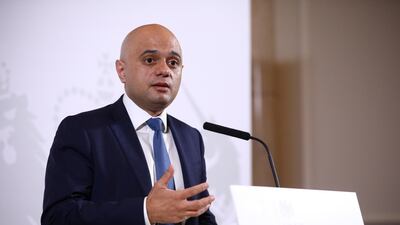Sajid Javid, the British Chancellor, has ordered a freeze on assets of the political wing of Hezbollah amid the fallout over the killing of the Iranian military general Qassem Suleimani.
In February Mr Javid, then Home Secretary, made the move to ban the Lebanon-based group in its entirety alongside Ansaroul Islam and JNIM who operate in the Sahel region in Africa.
A Treasury notice reminded banks and financial institutions that accounts linked to Hezbollah must be closed. “Failure to comply with financial sanctions legislation is a criminal offence or to seek to circumvent its provisions is a criminal offence,” it said.
"Following the annual review of the existing designation against Hezbollah Military Wing, the decision was taken to designate the entire organisation under the Terrorist Asset-Freezing Act etc 2010 (TAFA)," a Treasury spokesperson told The National.
"This brings the designation in line with the Home Office proscription of the organisation in 2019. The existing listing of Hezbollah Military Wing is an EU-wide listing. This remains in place and still applies in the UK."
“The UK remains committed to the stability of Lebanon and the region, and we continue to work closely with our Lebanese partners," the spokesperson added.
The Iran-linked organisation’s military group has already been outlawed by Britain and the country deems it a terrorist organisation. It leads some of Iran’s proxy militias in the Middle East, that hold sway in parts of eastern and southern Syria and northwest, as well as several suburbs around the capital Damascus.
The opposition Labour party criticised the proscription when it came into effect in February last year, saying that it was motivated at the time by the leadership campaign then underway in the ruling Conservatives.
Nicholas Heras, Middle East portfolio manager at The Institute for the Study of War, told The National that Friday's announcement from the British Treasury shows that Britain is working to align itself with US policy on Hezbollah "at the strategic level".
"The UK also is seeking to close itself off as a target for Hezbollah external operations. The UK sees Hezbollah as a clear and imminent threat to the security of the British Isles," he added.
The move comes amid heightened tensions over the targeted killing of Iran's most senior general by the US. Suleimani was killed by a drone strike at Baghdad Airport in the early hours of January 3.
Iran has vowed to avenge his killing and the country has since responded with a barrage of missiles aimed at two US bases in Iraq, inflicting no casualties.
Hours later, an Iranian Revolutionary Guard unit accidentally shot down a Ukraine International Airlines flight leaving Tehran airport, killing all 176 people on board. The passengers were mainly Iranian nationals but included 57 Canadians.
Iran's President Hassan Rouhani called the downing of the passenger plane "a human error".

